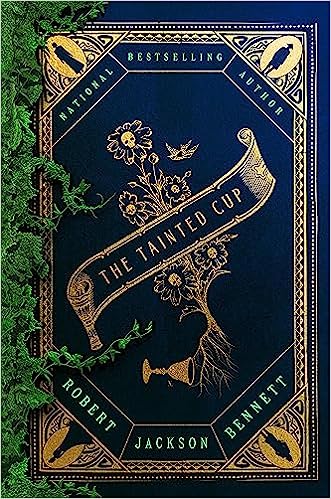Anything Robert Jackson Bennett writes is an auto-buy from me, and even though I know to expect his typically stellar mix of action, characterization, and canny plotting, I’m always delightfully surprised by his ability to innovate within the fantasy genre. Previously in his Founders Trilogy, he managed to make computer and software engineering work in a fantasy setting. Now with The Tainted Cup, he’s working with biohacking and genetic engineering, all set within a world of swords, carriages—and leviathans lurking in the seas.
The world is vaguely Roman, with plenty of references to legions and a emperor (and an appropriate refusal to use the letter J), but Bennett wisely let us fill in the blanks, letting the color seep in naturally. He’s more interested in the divergent elements, most notably the bio-magic and the threat of kaiju-like attacks, and lets those take a central role in the unfolding murder mystery.
We begin with one death, that of a high-ranked official visiting a home of one of the empire’s wealthiest families. An assassination within the inner corridors of the highly-guarded compound is bad enough, but the murder weapon is even more unsettling: some kind of spore or cutting made it past the wards, and then erupted through the official’s body, its hyper-accelerated growth tearing him to bits.
Dinios Kol seems, at first, like an ordinary bureaucrat, inexperienced but eager to prove himself when he begins investigating this bizarre crime. He is given this task not because of any great skill on his part, but because he is an engraver, a magically-enhanced individual who is incapable of forgetting any detail. Once he observes it, Din can perfectly recall the details of any scene, conversation, or other experience.
There’s never a convenient time for murder, but these murders may not only have come at the worst possible time, they may have caused it. The sudden deaths of multiple engineers causes a breach in the empire-encircling wall, the first and main line of defense against the leviathans, and therefore puts the entire empire at risk. Solving this potential case of sabotage is paramount, and Din and his superior Ana race to investigate even as the legions race to enact last-ditch defenses.
The foulmouthed, irrepressible Ana is certainly a Holmesian character in the sense that she is a keen observer and ardent proponent of deductive reasoning—and has a penchant for big reveals. But whereas Sherlock Holmes is devoted to criminology and gets all grumpy and cocaine-y when deprived of murder-puzzles, Ana is not so narrow in her obsessions. She is interested in absolutely everything: the angle of gradation of the road, the mercantile trends of previous centuries, the exact way Din makes tea. Ana wants all available data, and there is some question whether her indiscriminate pursuit of knowledge is actively useful, relatively harmless, or a problematic sign of apophenia.
Pointing toward the problematic are Ana’s ample flaws: she’s profoundly anti-social, hypersensitive to stimuli, and has about as much tact as a drunk toddler. (NB: Geekly Inc. does not condone underage drinking.) In other words, she’s delightful. I love her, and I love her dynamic with the long-suffering Din, who is by turns exasperated and awed by her abilities.

Din, too, is a delight, though it takes a bit longer for his natural reserve to become endearing. He’s an avatar of the plot before he asserts his own idiosyncrasies, perhaps a necessary delay since Bennett crams a lot of detail into this book. There’s a significant cast in terms of both breadth and depth of characters, multiple locations, multiple lines of inquiry, and maybe even multiple perpetrators. It’s a hugely complex undertaking that Bennett works hard to keep contained for us, and he succeeds admirably. Once I had a handle on the world itself, I had no trouble following the complexities and twists.
The prose was at times a bit teeter-tottery, vacillating between a slightly stilted formality circa the 1930s and a modern cadence. It felt like Bennett had absorbed the entire classic mystery genre (especially the Nero Wolfe cannon, according to the afterward) as research, and was veering into it now and then by accident. But it’s a very small thing, really. The mystery carries the narrative swiftly along, as twisting and layered as you could ask for.
With great characters and a breathless narrative pace, I couldn’t help myself from racing through The Tainted Cup in a few short days. I loved being immersed in its fully-realized, intricate world and the nested mysteries that encompassed everything from imperial machinations to intimate moments of connection, and I was despondent when I finished it and had no sequels to jump into (yet!). This is—no surprise—another stellar novel to add to my—and hopefully your—growing RJB shelf.
The Tainted Cup will be released February 6, 2024.
